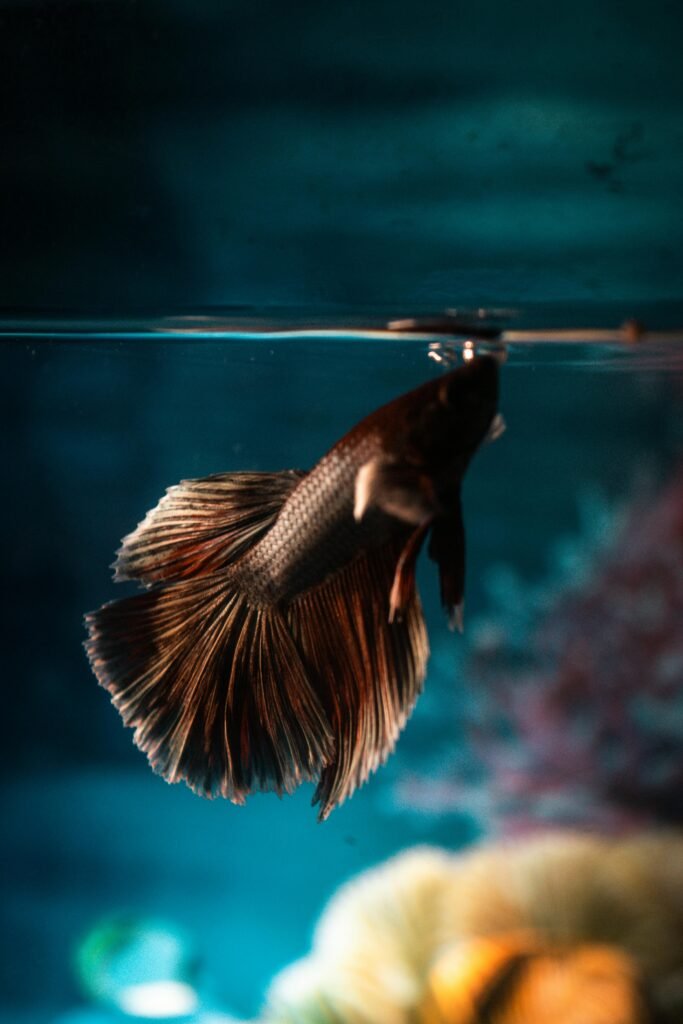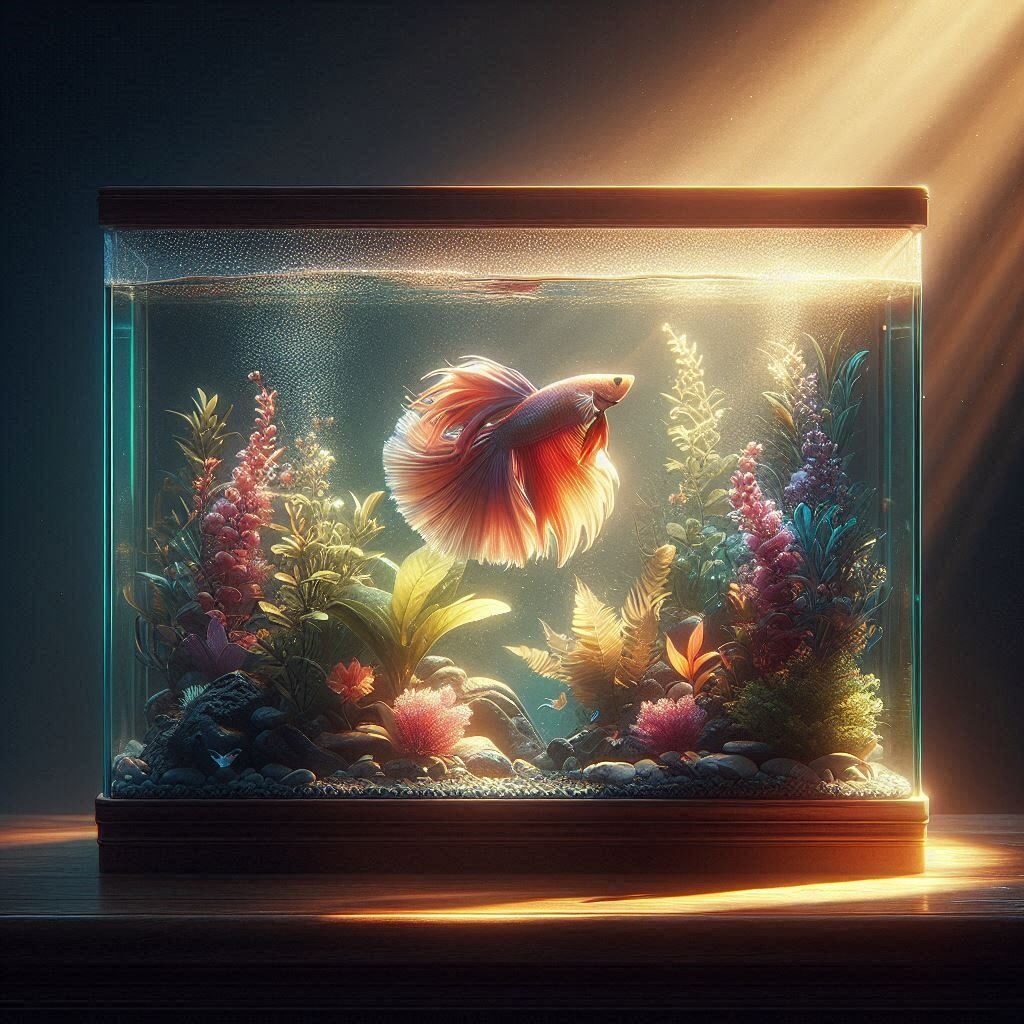Introduction
Betta fish, also known as Siamese fighting fish, are popular pet choices. Their attractive, vibrant color and flowing fins make them a first choice for fish enthusiasts. Whether you are an expert or a new Betta fish owner, you must be wondering, “Do Betta fish need sunlight?”
The answer to this question is not that straightforward. But if you want to know, in short, sunlight is not strictly necessary for Betta fish, but a moderate amount of natural daylight can be beneficial for their health and happiness. Various aspects determine whether Betta fish need sunlight or not. Let’s dive into this article “Do Betta Fish Need Sunlight? Fish Tank Guide” to explore the relationship between Light and Betta fish and understand the balance of natural light in their environment.

Understanding Betta Fish Habitat and Natural Lighting
Betta fish are native to tropical islands of Southeast Asia, including Thailand, Malaysia, Indonesia, Vietnam, Laos, and Cambodia. In their natural habitat, Betta fish live in warm, shallow waters, particularly in rice paddies, marshes, and small streams shaded by dense vegetation and overhanging trees.
Importance Of Light For Betta Fish
In the wild, betta fish thrive under natural lighting conditions, which help regulate their daily rhythms. Dense vegetation and plants provide a variety of light conditions where betta fish receive indirect sunlight filtered through water and this vegetation. Betta fish have excellent vision and can see a wide range of colors.
Betta fish have a variety of vibrant colors and flowing fins that become more vibrant in lighting. Moreover, their eyes contain cones that are sensitive to red, green, and blue light. Proper lighting allows them to appreciate the vivid colors of their environment.
Does Betta Fish Like Sunlight?
Betta fish like natural light to a certain extent, as it helps to regulate their biological clock and can enhance their coloration, making their scales look more vibrant. With that said, they are not fond of direct sunlight and prefer shaded areas where they can hide from bright sun exposure.
This preference stems from their instinctual need for protection from predators and the need for stable temperatures. However, they are not dependent on direct sunlight and can thrive under artificial lighting if adequately managed. Ensuring your Betta fish has access to light conditions similar to their natural setting is key to maintaining a healthy habitat.
Benefits Of Providing Natural Sunlight For Betta Fish
Providing natural sunlight in moderation can come with several benefits
Enhanced Colors:
Betta fish are popular for their striking, vibrant colors and flowing fins. Natural sunlight can help enhance these vibrant colors, making their scales appear more lustrous. Many owners notice that exposure to the right amount of light highlights the rich colors of betta fish, making them more visually stunning in their tanks. The natural spectrum of sunlight enhances their pigmentation, showcasing their beauty.
Improved Mood and Activity:
Betta fish tend to be more active and exhibit healthier behaviors when they receive the correct balance of light. Exposure to natural sunlight regulates their circadian rhythms, improving their mood and activity levels. Natural sunlight can stimulate betta fish’s natural behaviors, making them more engaged and comfortable in their environment.
Supports Good Health:
Natural sunlight can provide betta fish with essential nutrients such as vitamin D. These nutrients promote growth, development, and good health, improve the immune system, and help with digestion and metabolism.
Maintain Day-Night Cycle:
In the wild, betta fish experience a consistent day-night cycle as the sun rises and sets. This day-night cycle is beneficial for their biological rhythms and sleep patterns. In fact, research shows that inconsistent light exposure can stress betta fish and shorten their lifespan. It is ideal to provide 14–16 hours of light per day for their activities and the remaining 8–10 hours to rest in darkness. Make sure to avoid direct sunlight and monitor the water temperature for overheating.
Plant Health:
Betta fish and the vegetation where they live need light for photosynthesis. Natural sunlight can support photosynthesis, keeping the live plants healthy and providing a more natural environment for the betta fish.
Disadvantages Of Too Much Sunlight For Betta Fish
Overheating Risks:
Direct sunlight can significantly raise the water temperature, leading to stress or health issues. Betta fish prefer water temperatures between 76°F and 82°F, so it is important to monitor the water temperature in the fish tank if you rely on natural sunlight.
Algae Growth:
Excessive sunlight promotes algae growth in water, leading to poor water quality and an unhealthy environment for the betta fish.
Sun Burn:
Just like humans, betta fish may be exposed to too much sunlight, which can cause sunburn. This could lead to skin damage and infections that, ultimately, cause death.
Role Of Sunlight In Betta Fish Tank
- Sunlight maintains a balance between natural light and artificial light, which is essential for keeping your Betta fish healthy.
- A well-thought-out lighting schedule of sunlight mimics the natural day-night cycles for betta fish, which is integral to their well-being.
- Adding sunlight to the betta fish tank helps replicate their natural habitat alongside live plants and decorations.
Natural Light vs. Artificial Light For Betta Fish
Natural Light:
Natural light is freely available and cost-effective. It helps provide essential nutrients to the betta fish and plants for their growth and development. While natural light may seem perfect for the betta fish, moderation is crucial. While indirect sunlight may benefit the betta fish and its environment, too much sunlight may lead to algae growth, sunburn, overheating of the water, increased stress, and poor water quality.
Artificial Light:
Artificial light controls light exposure in a fish tank. It comes in the form of LED and Fluorescent lights. They provide a wide range of colors and designs that can be adjusted according to your betta fish’s needs. The downside of artificial light is that it may be expensive and needs proper installation. Artificial light provides stable light conditions irrespective of the day-night cycle outdoors.
Is Sunlight Better Than Artificial Light For Betta Fish Tank?
The best approach is to use a combination of both sunlight and artificial light. Each type of lighting offers distinct benefits and disadvantages. However, artificial light is often better than natural light as it provides more control over the light intensity and helps in regulating water temperature as per betta fish needs.
Do Betta Fish Need Light at Night?
Betta fish do not require light during night time. In fact, it is recommended that they provide 8 to 12 hours of a daily dark period of time for their rest and mimic their natural day-night cycler.
How Many Hours of Light And Dark Do Betta Fish Need Each Day?
In the wild, betta fish experience a consistent day-night cycle as the sun rises and sets. This day-night cycle is beneficial for their biological rhythms and sleep patterns. It is ideal to provide 14–16 hours of light per day for their activities and the remaining 8–10 hours to rest in darkness. This schedule can help avoid stress and maintain the fish’s biological clock.
Factors to Consider When Providing Sunlight for Betta Fish
- Make sure to position the fish tank in an adequate place where it can get indirect sunlight
- Avoid overexposure or direct exposure to sunlight as it can harm the betta fish and its environment.
- Monitor the water temperature and make sure not to overheat.
- Add sufficient plants and decorations in your fish tank to provide them with a hiding place and regulate their body temperature.
Tips for Providing Adequate Lighting To The Betta Fish Tank
- Use The Right Light: Use the right light for your betta fish according to your tank size and tank position.
- Using a Timer: A timer can help maintain a consistent light-dark cycle, ensuring your betta fish receive the right amount of light and darkness each day.
- Avoiding Direct Sunlight: Place the tank where it can receive filtered or indirect sunlight without direct exposure to avoid overheating and algae growth.
- Monitor the Water Temperature: To avoid temperature fluctuation in your betta fish tank, monitor the water temperature using a thermometer.
- Observe Your Betta Behavior: Observe your Betta’s behavior under different lighting conditions. If the fish appears stressed or lethargic, consider adjusting the intensity or duration of the light.

Conclusion
Whether you are a professional or a new fish keeper, understanding your Betta fish’s need for sunlight is essential for creating a healthy aquarium environment. “Do Betta Fish Need Sunlight? Fish Tank Guide” is a helpful guideline for understanding the importance and use of natural light or sunlight for your betta fish.
By providing a balanced approach to both natural and artificial lighting, considering their natural habitat, and ensuring temperature stability, you can enhance the quality of life for your Betta fish. Remember “A Healthy Betta Is A Happy Betta”
Frequently Asked Questions
Q: Can I place my Betta fish tank near a window?
A: Placing it near a window can provide natural light, but ensure it does not receive direct sunlight to avoid overheating.
Q: How can I tell if my Betta fish is stressed?
A: Signs include lethargy, hiding, dull colors, or erratic swimming patterns.
Q: What is the best artificial light for Betta fish?
A: Look for LED lights with adjustable settings that can mimic natural day/night cycles.
Q: Should I turn off the tank light at night?
A: Yes, allowing a dark period is essential for their natural behavior and well-being.
Q: How can I create a natural environment for my Betta fish?
A: Use plants, caves, and soft substrate, along with proper lighting conditions to mimic their natural habitat.
Q: Can I use natural sunlight as the sole light source for my betta tank?
A: It’s not recommended to rely solely on natural sunlight due to the risk of overheating and algae growth. A combination of indirect sunlight and artificial light is ideal.
Q: How can I prevent algae growth in my betta tank exposed to sunlight?
A: Limit the duration of direct sunlight exposure, use a timer for artificial lights, and perform regular tank maintenance to keep algae in check.
Q: Is it okay to keep my betta tank in a dimly lit room?
A: Betta fish need a consistent light cycle. A dimly lit room can be supplemented with artificial light to provide the necessary 8-12 hours of light each day.
Q: What type of artificial light is best for betta fish?
A: Full-spectrum LED lights that mimic natural sunlight are ideal. They provide the necessary light spectrum for both betta fish and live plants.
Q: How do I know if my betta fish is getting too much light?
A: Signs of too much light include increased algae growth, stressed behavior in the fish, and a rise in water temperature. Ensure your betta has shaded areas and adjust the light duration as needed.
You May Also Checkout:

